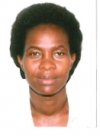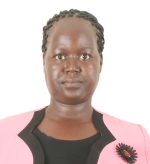Nixon Niyonzima
ID: UNCST-2020-R014577
|
Evaluating Tumor Evolution and the Clinical Utility of Circulating Tumor DNA in Patients with Metastatic Breast Cancer Treated with Talazoparib
REFNo: HS1476ES
1. Evaluate mutational changes associated with disease progression in patients with metastatic breast cancer treated with Talazoparib2. Analyse circulating tumor DNA in blood samples collected from metastatic breast cancer patients treated with Talazoparib.3. Determine the association between circulating tumor DNA levels, CA-15-3 levels, and clinical response in patients with metastatic breast cancer treated with Talazoparib.4. Determine the blood-based tumor mutation burden (bTMB) based on WES data generated from samples collected before and after the development of treatment resistance in metastatic breast cancer patients treated with Talazoparib.5. Evaluate the utility of circulating tumor DNA genomic profiling from blood samples collected as dried blood spots from patients with metastatic breast cancer patients and normal age-matched healthy controls.
|
Uganda |
2021-06-30 |
2024-06-30 |
Medical and Health Sciences |
Non-Clinical Trial |
Non-degree Award |

|
EDITH NAKKU-JOLOBA NAKKU
ID: UNCST-2021-R013931
|
Sexual Network Based Tracking and Treatment of Gonorrhea and Chlamydial infections to Improve STD Management in Urban and Rural Uganda: A Pilot Study
REFNo: HS1384ES
Specific Objective 1a; To estimate prevalence of Neisseria gonorheae (NG) in persons attending outpatient clinics in Kampala, Uganda.
Specific Objective 1b; To estimate prevalence of Chlamydia trachomatis (CT) in persons attending outpatient clinics in Kampala, Uganda
Specific Objective 2; To describe the sexual networks of persons diagnosed with Neisseria gonorrhea and Chlamydia trachomatis attending clinics in Kampala, Uganda and the factors influencing these networks.
Specific Objective 3; To describe the bacterial genotypes of infecting Neisseria gonorrhea and Chlamydia trachomatis bacteria identified in these described sexual networks and the related-ness of the bacteria in the identified sexual networks.
|
Uganda |
2021-06-29 |
2024-06-29 |
Medical and Health Sciences |
Non-Clinical Trial |
Non-degree Award |

|
Susan Nabadda
ID: UNCST-2020-R014331
|
Diabetes Mellitus Tuberculosis and HIV multimorbidities among adult patients attending Kiruddu National Referral Hospital, Uganda
Version 2 7/26/2020.
REFNo: HS1386ES
General Objective
The overall objective of this project is to determine the prevalence of DM among patients with either TB, HIV, and TB-HIV co morbidity. This will help to assess the prevalence of silent DM in these categories of patients.
Specific objectives
1. To describe the prevalence of DM among either TB patients or HIV patients or patients with both TB and HIV co morbidity attending the Kiruddu hospital outpatient clinics
2. To determine the factors associated with DM in patients with HIV alone, TB alone and HIV – TB co-infection.
|
Uganda |
2021-06-29 |
2024-06-29 |
Medical and Health Sciences |
Clinical Trial |
Non-degree Award |

|
Richard Ssempala
ID: UNCST-2021-R004837
|
Access to Health Care Services in Uganda: The feasible Community health care services delivery model for Uganda.
REFNo: HS1491ES
2. To identify the designs and feasible models for implementing community health care services/ packages in Uganda.,1. To identify the health services/packages provided at community level under the different intervention types.,To review databases of studies that define different delivery mechanisms (models) for the community health services/packages and thereafter recommend a feasible community delivery model(s) for Uganda ,
|
Uganda |
2021-06-29 |
2024-06-29 |
Medical and Health Sciences |
Non-Clinical Trial |
Non-degree Award |

|
Teesta Dey
ID:
|
Systematic development and validation of a Post-Natal Maternal Self-Assessment Tool for predicting post-natal morbidity in the immediate postpartum period following healthcare facility births in Uganda
REFNo: SS876ES
General Objective
To develop a valid, reliable, useful and acceptable post-natal maternal self-assessment tool for predicting post-natal morbidity in health care facilities in Uganda
Specific Objectives
1. To explore immediate postnatal care provision, coverage and utilisation in healthcare facilities in Uganda and elicit opportunities to improve care
2. To establish the core content of the tool
3. To create a tool that is culture and setting specific to postnatal Ugandan women
4. To assess the tool for validity and reliability
5. To evaluate the feasibility, acceptability and usability of the post-natal maternal self-assessment tool
For each specific objective there are sub-objectives listed within the protocol as attached
|
UK |
2021-06-28 |
2024-06-28 |
Social Science and Humanities |
|
Degree Award |

|
David Musoke
ID:
|
Maximising benefit and minimising the harm of COVID-19 control measures on child and women’s health in Uganda
REFNo: SS881ES
The aim of this research is to assess the negative impact of COVID-19 disease control measures, including lockdown, on child and women’s health in Uganda with diverse pandemic and distinct policy approaches.
Specific objectives
1. Describe the design, evolution and effects of COVID-19 control measures and understand the policies, strategies and measures put in place.
2. Conduct a rapid impact assessment of COVID-19 and its control measures on health systems functioning with a focus on child health and women’s health.
3. Identify interventions, including further research, to optimise COVID-19 control measures.
|
Uganda |
2021-06-28 |
2024-06-28 |
Social Science and Humanities |
Non-Clinical Trial |
Non-degree Award |

|
Joshua Musinguzi Bazaale
ID:
|
Uganda Refugee Population-Based HIV Impact Assessment (RUPHIA 2021)
REFNo: HS1443ES
Primary Objectives
To estimate the following in a household-based, representative sample of adult refugees, aged 15+ years:
1) Prevalence of HIV in adult refugees in Uganda
Secondary Objectives
To estimate the following in the Ugandan refugee population aged 15+ years:
1) Prevalence of HIV viral load suppression (VLS - defined as HIV RNA <1000 copies/milliliter (mL));
2) Prevalence of HIV-related risk behaviors, knowledge, and attitudes;
3) Behavioral and demographic determinants of HIV prevalence;
4) Exposure to, uptake of and barriers to access to HIV-related services;
5) Prevalence of primary and secondary antiretroviral (ARV) drug-resistance (DR) among refugees with viral loads greater than 200 cp/ml;
6) Assess progress towards achievement of the Joint United Nations Programme on HIV and AIDS (UNAIDS) 90-90-90 targets
|
Uganda |
2021-06-28 |
2024-06-28 |
Medical and Health Sciences |
Non-Clinical Trial |
Non-degree Award |

|
FRED SEMITALA COLLINS
ID: UNCST-2020-R014096
|
ENGAGING PRIVATE COMMUNITY PHARMACIES IN EARLY TB CASE FINDING IN KAMPALA, UGANDA
REFNo: SS804ES
1.To understand the perspectives of stakeholders on TB screening to improve early TB case finding at private community pharmacies in Kampala through a formative assessment.
2.To refine components of the proposed intervention to improve early TB case finding at private pharmacies in Kampala, based on findings of the formative research in objective 1.
3.To evaluate the feasibility, fidelity, and acceptability of the intervention to improve early TB case finding at private pharmacies in Kampala using the Reach, Effectiveness, Adoption, Implementation and Maintenance (RE-AIM) framework.
|
Uganda |
2021-06-25 |
2024-06-25 |
Social Science and Humanities |
|
Non-degree Award |

|
Christine Begumisa Titianah
ID:
|
Unmet Need in Essential Medicines and Health Supplies in Ugandan Public Health Facilities.
REFNo: SS886ES
Our first research aims to assess the effect of shortages of selected medicines and health supplies on patients on patients in district-level MOH facilities
The following objectives will facilitate the achievement of this aim:
1. To collect data from health facility registers in order to list 100% of prescriptions written at a representative sample of MOH health facilities over 3 National Medical Stores distribution cycles.
2. To calculate how often filled, unfilled and modified prescriptions affect 100% of patients within selected districts over a 6-month time period, or 3 (as sheduled) National Medical Stores (NMS) cycles, depending on which is longer
3. To compare and contrast the availability of 59 essential medicines throughout each NMS distribution cycles
4. To compare health supply patterns for when medicines are in stock vs. out of stock and describe differences in functioning between medicines and health supplies over 3 NMS cycles.
5. To design and pilot a template approach to tracking data over a six-month period, in order to support continuous improvement in health systems in Uganda.
Our second research aim is to share data on the extent of medicine and health supply shortages with Uganda’s MOH and other stakeholders in order to inform corrective action The following objectives will facilitate the achievement of this aim:
1. To analyse the extent of medicine and health supply shortages within health facilities in MOH over a period of 6 months
2. To provide recommendations that may influence decisions that improve medicine and health supply management, benefit patients, and can be scaled to other regions.
|
Uganda |
2021-06-25 |
2024-06-25 |
Social Science and Humanities |
Non-Clinical Trial |
Non-degree Award |

|
Nuwagira Catherine
ID:
|
Propagation and Growth performance of Schkuhria pinnata L, for Optimal Phytochemical Contents and Antimalarial Activity in Uganda
REFNo: HS1516ES
Main objective
To examine the most viable propagation avenues and growth performance in relation to phytochemical contents and antimalarial activity of S. pinnata in Uganda.
Specific objectives
1. To evaluate agronomic dynamics of S. pinnata under varying climatic conditions of AEZs of Western and South Western Uganda
2. To examine the propagation potentials of S. pinnata through micro-propagation.
3. To evaluate phytochemical components and determine quantitative variations of flavonoids at four developmental stages
4. To determine acute dose and evaluate the plant age effect on antimalarial activity of S. pinnata.
|
Uganda |
2021-06-24 |
2024-06-24 |
Medical and Health Sciences |
Non-Clinical Trial |
Degree Award |

|
ONESMUS BYAMUKAMA
ID: UNCST-2021-R013826
|
FACTORS ASSOCIATED WITH SHORT INTERDELIVERY INTERVAL AMONG WOMEN WITH ANTECEDENT CESAREAN DELIVERY AT MBARARA REGIONAL REFERRAL HOSPITAL.
REFNo: HS1354ES
1. To determine the proportion of women with a prior antecedent cesarean delivery who present with a short interdelivery interval at Mbarara Regional Referral Hospital.
2. To determine the factors associated with a short interdelivery interval among women delivering at Mbarara Regional Referral Hospital with a prior antecedent cesarean delivery.
|
Uganda |
2021-06-24 |
2024-06-24 |
Medical and Health Sciences |
Non-Clinical Trial |
Degree Award |

|
JUSTUS BARAGEINE KAFUNJO
ID: UNCST-2020-R014150
|
COMPREHENSIVE REINTEGRATION ASSISTANCE FOR WOMEN WITH FEMALE GENITAL FISTULA: INTERVENTION PILOTING
REFNo: SS890ES
Aim 1: To understand the feasibility and acceptability of a pilot reintegration program for female genital fistula.
Aim 2. To assess the acceptability of the pilot reintegration intervention to patients, intervention implementors.
Aim 3. To assess the preliminary effectiveness of the pilot reintegration intervention.
|
Uganda |
2021-06-24 |
2024-06-24 |
Social Science and Humanities |
Clinical Trial |
Non-degree Award |

|
CHARLES BENSTONS IBINGIRA RUKAMBURA
ID: UNCST-2021-R008521
|
: NANOBODY BASED POINT OF CARE DIAGNOSTIC KIT FOR CERVICAL CANCER
REFNo: HS1414ES
This study will to generate and characterise nanobodies for early cervical cancer diagnosis targeting non-invasive biomarkers expressed in urine. Specifically, the study will ,
1. Determine the expression levels of cervical cancer discriminatory urine biomarkers at different stages among cervical cancer cases,
2. Generate nanobodies cross-reactive to target cervical cancer specific biomarkers secreted in urine/cervical mucus, and
3. Develop and validate a Nb based lateral flow based multiplex biomarker detection assay for cervical cancer.
|
Uganda |
2021-06-24 |
2024-06-24 |
Medical and Health Sciences |
Non-Clinical Trial |
Non-degree Award |

|
Harriet Akello
ID: UNCST-2021-R013785
|
Relationship between mental health and health work functioning during the covid-19 pandemic in Uganda
REFNo: HS1407ES
To identify connection between depression, anxiety and stress with health functioning during COVID-19 pandemic ,To determine prevalence of depression, anxiety and stress among healthcare workers during COVID-19 pandemic ,To determine relationship between mental health and health work functioning during covid-19 pandemic in Uganda,
|
Uganda |
2021-06-24 |
2024-06-24 |
Medical and Health Sciences |
Non-Clinical Trial |
Degree Award |

|
Jackson Amone
ID:
|
A usability study on the knowledge and practice of a novel Medium Pressure Reservoir oxygen prototype in Uganda
REFNo: HS1497ES
Phase 2: The primary objective of the usability study is to gather clinical and BMET feedback on the use of the MPR with patients of diverse characteristics and its ability to function through power interruptions &/or in situations where there is high patient volume,Phase 1: The primary objective of the simulated use summative evaluation is to gather evidence of safe and effective use of the device to support regulatory filing.,
|
Uganda |
2021-06-24 |
2024-06-24 |
Medical and Health Sciences |
Non-Clinical Trial |
Non-degree Award |

|
JUDITH NASSAAZI
ID: UNCST-2023-R007664
|
LONG TERM EFFECTS OF ORTHOPAEDIC INJURY ON PATIENTS IN UGANDA
REFNo: HS1047ES
General Objective
To determine long-term effects of orthopaedic injury on patients in Uganda 8years following the injury.
Specific Objectives
• To determine the long-term economic impact of tibia and femur fractures on patients and their families
• To determine the health related quality of life of the patients who sustained tibia and femur fractures 8years following their injuries.
|
Uganda |
2021-06-23 |
2024-06-23 |
Medical and Health Sciences |
|
Non-degree Award |

|
Kaijuka Benson
ID:
|
CORPORATE SOCIAL RESPONSIBILITY AND FINANCIAL PERFORMANCE OF SAVINGS AND CREDIT COOPERATIVE SOCIETIES IN UGANDA. A CASE
STUDY OF MITOOMA DISTRICT, WESTERN UGANDA
REFNo: SS668ES
The research will specifically tackle the following research objectives; to establish the level of investment made in philanthropic involvement activities on the financial performance of SACCOs in Mitooma district, Western Uganda, to examine the role of investment made in ethical involvement activities on the financial performance of SACCOs in Mitooma district, Western Uganda and to find out how of investment made in economic involvement activities on the financial performance of SACCOs in Mitooma district, Western Uganda.
|
Uganda |
2021-06-23 |
2024-06-23 |
Social Science and Humanities |
|
Degree Award |

|
Rosalind Parkes-Ratanshi Parkes
ID: UNCST-2019-R000717
|
Characterizing STIs and antimicrobial resistance in men with urethral discharge syndrome in Uganda
REFNo: HS1338ES
Primary:
• To assess and compare the prevalence of pharyngeal STIs (gonorrhea, chlamydia) in relation to urogenital STIs, characterize the antimicrobial resistance (AMR) profile of pharyngeal and urogenital gonorrhea, and identify demographic and behavioral risk factors associated with STIs at different anatomical sites. STIs and AMR profiles will be determined using a combination of traditional laboratory methods (cultures) and molecular approaches, including, but not limited to nucleic acid amplification tests (NAATs).
Secondary:
• To assess acceptability of self-collected tests in men with UDS and pharyngeal testing for STIs in Uganda.
• To estimate the prevalence of 4 STIs in a population of men with UDS caused by the following pathogens: Chlamydia trachomatis (CT), Neisseria gonorrhoea (NG), Trichomonas vaginalis (TV), and Mycoplasma genitalium (MG) using NAATs.
• To estimate the proportion of STIs (CT/NG/MG) at multiple anatomical sites (penis and pharynx (throat))
• To assess the prevalence of HIV and syphilis, and compare HIV result to self-reported HIV status.
• To explore socio-demographic, behavioural and clinical factors associated with positive STI diagnosis and antimicrobial-resistant infections.
• To compare the antimicrobial susceptibility profiles of pharyngeal and urogenital NG isolates recovered the same participant(s).
• To compare the distribution of AMR markers in pharyngeal and urogenital NG.
• To determine the effectiveness of treatment for urogenital NG infections on pharyngeal infections.
• To explore the feasibility of detecting NG and AMR markers using a single-cell molecular approach directly from pharyngeal samples.
• To collect pharyngeal samples for future metagenomics analysis to explore the role of microbiome on pharyngeal NG infections and AMR.
• To explore the role of commensal Neisseria species on the development of AMR in NG.
To provide samples to be added to the Johns Hopkins International STI biorepository at Johns Hopkins School of Medicine, Baltimore, MD USA.
|
UK |
2021-06-23 |
2024-06-23 |
Medical and Health Sciences |
|
Non-degree Award |
.jpg)
|
Mohammed Lamorde
ID: UNCST-2019-R001293
|
Drug Interactions between Dolutegravir (DTG) and escalating-doses of Rifampicin (RIF) Study
REFNo: HS1376ES
The secondary objectives of the trial are to determine the safety and tolerability of the DTG/RIF combination, the PK of RIF, induction of PgP and CYP3A4 and effect of DTG on appetite,Primary Objective The primary objective of the study is to determine changes to the PK parameters of DTG when administered with standard, medium and high doses of RIF in HIV-negative, TB-monoinfected participants coming to the end of continuation TB therapy with standard doses of RIF and INH over a 10 week period,
|
Nigeria |
2021-06-23 |
2024-06-23 |
Medical and Health Sciences |
Clinical Trial |
Non-degree Award |

|
Mark Okwir
ID: UNCST-2021-R013417
|
Meningitis: Burden, Causes, Pathogenesis and Prevention in Rural Northern Uganda
REFNo: HS1420ES
Aim 1: To prospectively collect data on all patients with meningitis and meningitis symptoms who were admitted to LRRH to assess etiologies and pathogenesis of meningitis using modern diagnostic testing not previously available and evaluate the causes, burden of disease, and outcomes of meningitis.
Aim 2: To perform CrAg screening of 10,000 HIV-positive patients to determine the prevalence of cryptococcal antigenemia and conduct a case control study to compare outcomes among CrAg-positive patients and CD4-matched CrAg-negative controls.
|
Uganda |
2021-06-23 |
2024-06-23 |
Medical and Health Sciences |
Non-Clinical Trial |
Non-degree Award |

|
| View |
|
Sort By: |
|
|
|
| |
|